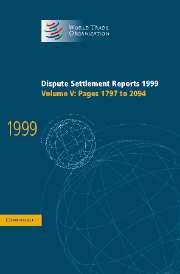India - Quantitative Restrictions on Imports of Agricultural, Textile and Industrial Products (WT/DS90) Report of the Panel
Published online by Cambridge University Press: 22 December 2017
Summary
INTRODUCTION
On 16 July 1997, the United States requested consultations with India, pursuant to Article 4 of the Understanding on Rules and Procedures Governing the Settlement of Disputes (“DSU”), Article XXII:1 of the GATT, Article 19 of the Agreement on Agriculture (to the extent it incorporates by reference Article XXII of the GATT), and Article 6 of the Agreement on Import Licensing Procedures (to the extent it incorporates by reference Article XXII of the GATT), concerning quantitative restrictions maintained by India on the importation of a number of agricultural, textile and industrial products (WT/DS90/1). The United States considered that the quantitative restrictions maintained by India, including, but not limited to, those tariff lines notified in Annex I, Part B of WT/BOP/N/24, appeared to be inconsistent with India's obligations under Article XI:1 and XVIII:11 of the GATT 1994, Article 4.2 of the Agreement on Agriculture and Article 3 of the Agreement on Import Licensing Procedures. At the same time, Australia, Canada, the European Communities, New Zealand and Switzerland requested consultations with India on these quantitative restrictions (WT/DS91/1; WT/DS92/1; WT/DS93/1; WT/DS94/1; WT/DS96/1) on the basis of similar claims to those set forth by the United States. Subsequently, Japan, the European Communities, Canada, Australia, Switzerland and New Zealand asked to join in the consultations requested by the United States (WT/DS90/2, WT/DS90/3, WT/DS90/4, WT/DS90/5, WT/DS/90/6, WT/DS/90/7). The United States and India formally consulted on these measures in Geneva on 17 September 1997, and Japan participated as an interested third party under Article 4.11 of the DSU.
On 3 October 1997, the United States requested that the WTO Dispute Settlement Body (“DSB”) establish a panel to examine this dispute. In its request, the United States considered that quantitative restrictions maintained by India, including, but not limited to, the more than 2,700 agricultural and industrial product tariff lines notified to the WTO in Annex I, Part B of WT/BOP/N/24 dated 22 May 1997, appeared to be inconsistent with India's obligations under Articles XI:1 and XVIII:11 of GATT 1994 and Article 4.2 of the Agreement on Agriculture. Furthermore, the import licensing procedures and practices of the Government of India are inconsistent with fundamental WTO requirements as provided in Article XIII of GATT 1994 and Article 3 of the Agreement on Import Licensing Procedures.
- Type
- Chapter
- Information
- Dispute Settlement Reports 1999 , pp. 1799 - 2056Publisher: Cambridge University PressPrint publication year: 2002
- 2
- Cited by



